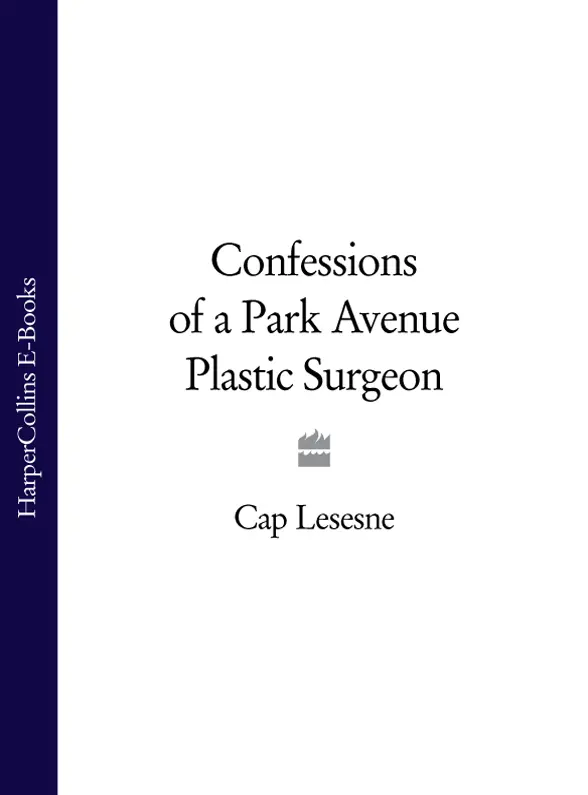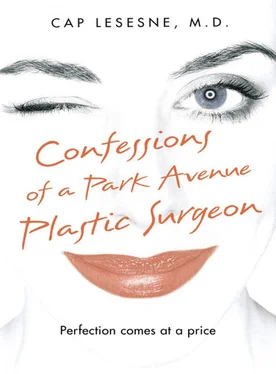
Confessions of a Park Avenue Plastic Surgeon
CAP LESESNE, M.D.

This book is dedicated to
JOHN M. LESESNE, M.D.,
and
DAVID C. SABISTON, M.D.,
physicians worthy of emulation
Cover
Title Page
Dedication
Epigraph
Preface: On the Table
Introduction
Youth (Without Surgery)
First Cut
I Don’t Have What It Takes
Love Affair
Blood Everywhere
Nasty Surgeons, Not Enough Sleep, and Other Myths
New York Practice
You Can’t Go Home Again
Model Behavior
About Face, Skin Deep
Women of the World
Competition
Aging Beauties, Rediscovered Youth
My Method
Men
I’m Ready for My Close-up Now
Failures (and What to Ask a Surgeon)
She Dies, You Die: The Royal Treatment
A Little Romance
The Royal Treatment, Part II
Reconstruction
You Want What?
I Don’t Do That
America’s Sweetheart
Raising Eyebrows
Sounds of Music
In a Zone
No One to Heal
The Limitations of Plastic Surgery
The Politician and the First Lady
We’re All Alike
The World Is My Museum
Acknowledgments
About the Author
Praise
Copyright
About the Publisher
I believe in strict patient confidentiality. To honor this principle, names and circumstances have been altered, and the identities of patients are known only to me. In those cases where patients have permitted their names to be used, I have done so.
The names of institutions, teachers, colleagues, staff, and friends are real. The same is true for celebrities – except, again, where they have also been patients.
The nightmare every surgeon dreads is coming true, before my eyes. My patient is dying.
And I don’t know why.
Lee McKenzie, a seventy-year-old Manhattanite and former literary agent, lies sedated on the table in my operating room. Maybe she’s dreaming about the face-lift she’s undergoing, and for which she’s saved up over many years. She couldn’t have been more certain that the operation would recharge her. She’d said so months before, when she’d visited my office at the urging of a friend on whom I’d done an eyelid lift. “Feeling ugly and rejected is no way to go through life,” said Lee. I wouldn’t have been shocked had she dumped a lifetime of accumulated coins and bills on my desk right there.
Lee had an unusually heavy neck, baggy eyelids, and lots of jowl, and very much looked her age. Observing her both in person and in photographs at age forty and forty-five, I determined we’d get the best outcome – a defined neck, with chin and jawline clearly separate from the neck – by removing fat from the platysma muscle between her clavicle and jaw, pulling the largely functionless muscle backward, and removing extra fat along the jawline. It’s an operation I’ve performed maybe three thousand times. Barring complications, she would be off the table and in the recovery room within three and a half hours from the moment she was wheeled into my OR. Bruising and swelling would be gone within two weeks, and she would look as if she’d bought seven to ten years.
Before I could operate, though, we had to confirm she was up to it. Her health, generally, was excellent. She had never smoked. Never had a heart problem. The preoperative tests – EKG, blood studies, stress test – all turned up normal. The morning of the operation, she was so excited she practically wheeled herself into the OR.
Now, a couple hours later, I am also experiencing a rush, but it’s because Lee is lying on my table just beneath me, her face opened from ear to mouth, and something is going very wrong.
The operation is still an hour from completion. I have finished removing fat and elevating the skin on her right side, and I am doing the same on the left when Lisa, my trusted anesthesiologist of fourteen years, says, “I have a problem.”
“What is it?” I ask.
“Her blood pressure’s dropping, her oxygen’s dropping, and I can’t reverse it.”
“What do you mean you can’t reverse it?”
“I’ve reduced the anesthetic, I’ve increased her fluid, I’ve given her medicine to bring the BP up, and it won’t go above ninety over fifty.”
“Let’s put her on one hundred percent oxygen,” I say.
Lisa does – to no avail. Two minutes later, Lee’s O 2level is still low and her blood pressure is down to 80/50.
My hands are moving as fast as possible. It’s not abnormal for patients to have brief episodes of low oxygen or blood pressure, but this one is persisting. I can’t simply stop operating. I have to close her up. And before I can do that, I have to stop the bleeding.
“I’m getting worried,” Lisa says. “Hurry up.” Like most anesthesiologists, Lisa is paid to be, among other things, cool. We’ve been through a lot and we trust each other; I’ve done face-lifts and other procedures on friends she’s referred to me. But the mix of symptoms manifesting in Lee is new to both of us. My mind runs through the possible explanations.
Heart attack? Maybe, but her EKG hasn’t changed.
Aspiration? Doesn’t jibe with the drop in BP.
Vasovagal syncope? Her O 2would be normal.
Could this be Lee’s normal blood pressure? Still doesn’t explain the oxygen drop.
Something going on in her head or nervous system? She has no history of neurological problems.
Pulmonary embolism? She’s too physically active for a blood clot.
Even though Lee’s EKG hasn’t changed, I go with the most reasonable possibility: heart attack. After twenty-plus years in training and private practice, this is, remarkably, the first time a patient of mine is suffering a heart attack midsurgery.
“Reverse all the anesthetic,” I tell Lisa. She shuts down the standard cocktail of fentanyl, propofol, and Versed that had ushered Lee into a “twilight” sleep, while I speedily continue closing incisions, tying fine nylon sutures, and inserting nickel clips in the scalp. Finally, Lee’s blood pressure begins to rise. Same with her O 2. Good. The sedation has worn off and it’s only local now. As Lee awakens – the still-opened side of her face resembling a cut watermelon – she asks groggily, “Are we done?”
“We have a little problem,” I say.
“What problem ?”
“Do you have chest pains?”
“No.”
Huh. Another indicator she did not have a heart attack.
“Shortness of breath?” I ask.
“No. What problem?”
“We didn’t like some of the readings,” I say.
Lee looks at me as if I were dense, as if I were from Neptune – as if I’ve forgotten why we are all gathered there and why I have gone into this profession to begin with. As if I’ve forgotten why she has spent every last discretionary penny to be lying here.
Читать дальше














